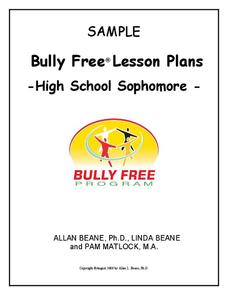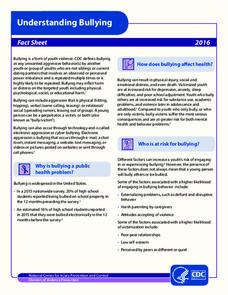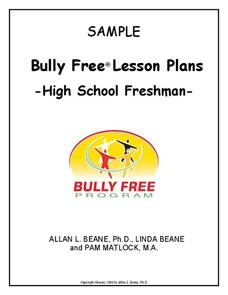Health Smart Virginia
What Is Mindfulness?
Stop. Breathe. Think. A richly detailed lesson on mindfulness introduces freshmen to meditation as a coping strategy to deal with stress.
Health Smart Virginia
Suicide Prevention - Finding the Words
Acknowledge, Care, Tell! Freshmen learn how to ACT to help a friend demonstrating warning signs for depression and suicide in a carefully scaffolded, scripted lesson. Scholars also learn positive coping skills, information about support...
Health Smart Virginia
Stressed Out
Stress, eustress, distress. A step-by-step plan leads middle schoolers through a lesson about coping with stress. To gather background information, scholars watch a presentation, examine a list of positive coping skills, and read...
Health Smart Virginia
Stress Management - Doctor Disease
Doctor, doctor, help me please! As part of their study of the correlation between disease and illness, middle schoolers take on the role of doctors. They rotate through 10 learning stations, read about patients' symptoms, and write a...
Nemours KidsHealth
STDs: Grades 6-8
Many adults find it difficult to imagine that some middle schoolers are sexually active, and thus they shy away from discussing sexual activity with young people. However, misinformation and lack of information about such topics as STDs...
Nemours KidsHealth
Germs: Grades 6-8
As part of their study of bacteria, viruses, fungi, and protozoa, middle schoolers create engaging public service announcements for preschool and kindergarten classes, teaching them how and when to wash their hands. To begin, class...
Health Smart Virginia
The Do Over
Middle schoolers are offered an opportunity to use what they have learned about effective communication in a "Do-over." First, they create a storyboard of an argument they had with a friend or family member that wasn't productive. Then,...
Health Smart Virginia
Life Saver
Tweens and teens learn how to be a lifesaver and help a peer who may be struggling with thoughts of suicide. They identify risk factors and warning signs, and strategies to get an individual to seek help.
Health Smart Virginia
Wrinkled Heart
Contrary to the old saying, words, like sticks, can hurt. That's the central idea in a lesson about the importance of considering another person's perspective, stopping, thinking, and listening before responding in anger to a conflict....
Nemours KidsHealth
Empathy: Grades K-2
Second graders read articles about being afraid, dealing with anger and apologizing. For this feelings lesson, 2nd graders read articles and discuss the feelings they have. Students describe their feelings and how to be supportive of...
Nemours KidsHealth
Conflict Resolution: Grades K-2
Learners complete discussion and activities to identify healthy ways of resolving conflicts. In this conflict resolution lesson, learners answer discussion questions, complete two conflict resolution activities, and one cartoon worksheet...
Curated OER
Using Words to Work Things Out
Students recognize a problem and how to resolve it. In this lesson, students listen to The Hating Book and discuss the events of the story. Students answer comprehension questions and relate to their own experiences. Students role play...
Curated OER
Another Trip to the Nurse's Office
Students consider the role of the nurse at their school. Using Internet resources and archived articles, they gather information regarding relevant health topics. Students use their information to create pamphlets on health topics...
Curated OER
Fix the Problem!
People won't let me finish talking!...I hate the lunch room...Leave my name alone! Explore a variety of problems learners can face on a daily basis, and use this game to have pupils determine the best ways to answer those situations.
PBS
Stories of Painkiller Addiction: The Cycle of Addiction
Drug addiction, including prescription drug addiction, begins with a reason that's different for every user. High schoolers learn more about the reasons people begin abusing drugs with a set of videos and worksheets that discuss four...
Curated OER
Autism is a World
Explore Autism by watching the CNN presentation: Autism is a World. Upper graders view and discuss the documentary identify the symptoms and characteristics of autism, research treatment options, and create an informational brochure.
Bully Free Systems
Bully Free Lesson Plans—10th Grade
Two lessons, "What Does Cyber Bullying Look Like?" and "Factors Influencing My Reporting the Bullying of Others," serve as examples of the 12 included in a Bully Free curriculum. Each plan includes discussion questions, an activity, and...
National Center for Injury Prevention and Control
Understanding Bullying
The anti-bullying movement has become a focus across the country. Become an anti-bullying expert with a informative factsheet that details bullying, who is affected by it, and how to prevent it from happening at your school.
Bully Free Systems
Bully Free Lesson Plans—Ninth Grade
"Bullying and Prejudice" and "Do You Cyber Bully," two lessons from a complete Bully Free program, serve as samples of the approach used in a unit designed to bring awareness to and to combat bullying. Each lesson asks class members to...
Bully Free Systems
Bully Free Lesson Plans—11th Grade
It takes courage to stand up to bullies. Two sample lessons from a complete Bully Free curriculum, "Courageous and Brave Bystanders" and "Assertiveness Skills for Bullied Students and Empowered Bystanders" provide participants with...
Bully Free Systems
Bully Free Lesson Plans—12th Grade
Two sample lessons from a curriculum unit on bullying provide high school seniors with an opportunity to assess their online and cell phone behavior and to consider how they can offer support to bullied students. Each plan includes an...
Bully Free Systems
Bully Free Lesson Plans—Seventh Grade
Having a hard time defining bullying with your seventh graders? Discuss the different types of behavior one would see in a bullying situation with a series of lessons, worksheets, and group activities.
Curated OER
A Poster is Worth a Thousand Words
Students list observations of PSA posters. They provide evidence/examples of their observations through class discussion. Students explore public health posters. They investigate historical public health campaign posters.
Curated OER
Final Project Presentations: Water Quality
Learners synthesize the information they have been researching on water quality to evaluate the potential health risks in a region with arsenic contamination. They prepare and present a persuasive speech that incorporates visuals.

























